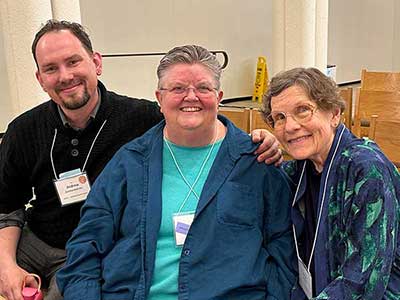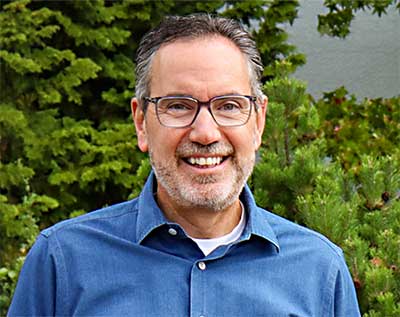| Search PNC News for stories of people and churches in our UCC Conference: |
|---|
Admiral UCC ready to transform building, lives
The Rev. Andrew Conley-Holcom, pastor of Admiral UCC, reported that a congregational meeting in November voted to donate their land and bring affordable housing to their neighborhood in a new project with space for their church.
 |
Andrew Conley-Holcom, pastor of Admiral UCC, is with two members, Anita Shafer and Peggy Rich at the PNC Annual Meeting 2024 in a discussion on small churches. |
The congregation plans move out of their church building in early summer 2025 when the preschool year ends and that in demolition of the building in planned to start within a few months of moving out. The plan is for Homestead Community Land Trust, a nonprofit organization that develops land and housing in trust, to complete the new building in 18 months.
During that time, Admiral will worship at St. John the Baptist Episcopal Church with low rent.
“We are on the vanguard of what more churches that grew in the baby boom era are experiencing as they can no longer maintain their buildings, but know their property, buildings and parking lots are valuable,” he said. “Some will sell, take the money and relocate. Others like us are staying to serve and become more engaged in the neighborhood.”
Andrew—who has served Admiral 10 years, his first church after graduating from Pacific School of Religion in 2014—sees this as an authentic moment for the church to live into the radical economic vision for the world, stepping out of capitalistic assumptions. He also sees churches picking up from the Poor People Campaign message that budgets and how organizations spend money are moral statements.
“The church should be about collective security,” he said. “This is the right time to be the church, to be a pastor and to have conversations.”
As churches pivot from their buildings, they are making decisions for the next 50 years, not to keep doing what they have been doing but allowing creative ministries to emerge.
“It is a time for the death and resurrection of baby boom churches,” he said, “as people inherit from the generation who built church buildings that no longer serve us. I’m excited. We can now more clearly think about our mission and use the wealth from our buildings.
Andrew grew up attending Wayside UCC in Federal Way. He earned a bachelor’s degree in 2005 in anthropology and a master’s degree in anthropology and genocide studies in 2010 from Western Washington University. He is chair of the PNC-UCC Dismantling Racism Task Force, which he says is a group getting together to continue the conversation started by PNC clergy of color at Annual Meeting in 2019. The Task Force was instrumental in developing the resolution for staff and board members to receive anti-racism training and is working to advance anti-racist growth across the conference.
“We are working with the Church Development Committee to plan a symposium for February to share the work that has been done with Church Development Committee (CDC) anti-racism grants,” he said, before turning back to the housing that will replace the church.
Because Homestead is intentional about inclusion, Admiral UCC is discussing who they want to build community with, to make sure the project is inclusive and impacts generational wealth and generational equality so there is meaningful impact on poverty and racism, he said.
Andrew is aware of the anxiety some white people feel about addressing racism and doing it right. He believes it’s important for the denomination and conference to articulate clearly what anti-racism and solidarity mean.
“That’s also important in relationship to articulating and advancing our Christian values in our neighborhood—including through current programs such as an arts group and children’s activities.”
 |
Mike Piraino helps Admiral develop affordable housing. Photo courtesy of Mike Piraino |
Helping spearhead the building negotiations and details is Mike Piraino. He was drawn to Admiral in 2020, after 10 years as a member of Alki UCC, because the church was across the street from his home and he knew Andrew from Alki-Admiral combined church functions.
Mike, who graduated in 1989 from Purdue University in Indiana in aerospace engineering, came to Seattle in 1990 to work for Boeing. He graduated from Seattle University’s Law School in 1995 and worked with a law firm serving Boeing on product liability.
He then moved into corporate finance and securities law law and worked with and at technology companies for the last 30 years. Now he works remotely as chief operating officer for ORCA Computing, a United Kingdom-based quantum computing company.
He grew up Catholic and his wife was Lutheran, so they looked many years for a church before finding Alki. They joined Admiral during COVID, and were excited to learn the congregation was looking at providing affordable housing and options for the future of the church, said Mike, who had participated in a discernment process at Alki.
Admiral was looking at options for remaining viable as a church: sell the property and move; develop part of the land and use funds to renovate the aging building or partner with an organization to bring affordable housing to people in a new structure that included church space.
Admiral chose the third option after connecting with Homestead and learning it had a way to help make the project a reality.
The church decided to donate the land to Homestead to develop affordable housing, and the church would have space in the project.
“We will tear down our building, build affordable housing and be a resident in the project,” Mike said.
Homestead secures funding so housing on the site is affordable for those earning less than 80 percent of the area median income.
“Our focus has been on being a neighborhood church as costs skyrocketed and pushed out many people,” he said. “Our ministry is focused on social justice, and this project allows us to provide affordable housing in the neighborhood we have been part of for more than 120 years.”
Part of the land was originally lands of the Coastal Salish or Duwamish Tribe.
“We researched titles to learn how church came to own the land and benefitted from exclusionary practices. We are on unceded ancestorial land of Duwamish. The land was never really ours, so we needed to benefit those traditionally excluded,” Mike said.
He explained that the U.S. government never honored the treaty with the Duwamish, so the land the church sits on was never formally ceded to the U.S. Government, but it granted those lands to settlers anyway. The U.S government granted land the church sits on to the family of a U.S. soldier who fought and died in the Seminole Wars in Florida, he said.
“The land grant includes my house,” Mike added.
Speculators acquired land from the family. Through that chain of title, the church came into possession of the land.
“It’s hard saying it is our asset,” Mike said. “We felt called to do something with the land that was thoughtful and inclusive. We had discussions with the Duwamish tribe.”
As Admiral’s pastor, Andrew engaged in dialogue with tribal members, who expressed appreciation for the choice, Mike said.
“We partnered with Homestead because they focus on home ownership. The affordable homes would be owned, creating generational wealth to bring families out of poverty,” he said. “It has impact on future generations. Homestead assures the housing remains affordable in perpetuity.
The 21-unit housing project will be 13 town houses and eight condos.
“Homestead helped us work closely with the neighborhood throughout the process, including inviting design inputs and keeping folks in the neighborhood informed on parking, safety and congestion,” he added.
“Homestead’s experience working with neighbors is important because we want to continue our ministry in the neighborhood,” Mike said. “We want to do it in a way that is perceived as positive, while bringing affordable housing and diversity to the neighborhood.
When Admiral started working with Homestead two years ago, the average price of a neighborhood home was $939,000, and the average rent of one-bedroom was $1,895 a month—affordable only to upper middle class.
In the 25 years Mike has lived there, the cost of living has increased dramatically, pricing many out.
“Addressing people unjustly excluded is a big deal for us as a church focused on social justice,” he said.
“We seek to live our beliefs and communicate to the community what we are about,” he said. “Our work to bring social justice is not just talk. The focus on tolerance, inclusiveness and social justice attracted me to the UCC.”
Homestead encouraged the church to go through a process to visualize its future and how it interfaces with the community, and then to decide what it needed physically as a church structure to do all of that.
Since signing an initial memorandum of understanding with Homestead in July 2023, Admiral teams and committees have worked with Homestead to negotiate and sign a formal purchase and sale agreement. They then worked on the project details and design with Homestead’s architects and advisors.
Mike said Admiral hopes construction will be completed in the first half of 2027.
Peggy Rich, one of about 40 members at Admiral, looks forward to tearing down the old building and building low-income housing with space for families with children to live together in community.
For information, call 206-932-2928 or visit admiralchurch.org.
Pacific Northwest Conference United Church News © December 2024
